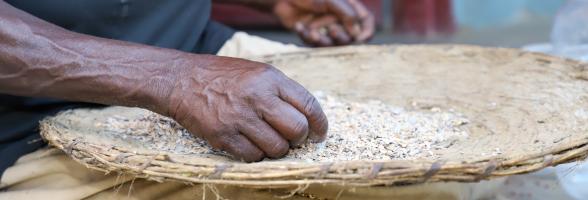CONTEXT
Land is an unlimited resource that has attracted the attention of the government, individuals, and private sectors causing land disputes. The Economic interests of private sectors and government, boundary confusion, and discrepancies within the land registry, laws, and policies on land.
Discriminative cultural practices among women and men are still highly practised in various parts of the country due to limited land awareness and capacity building in transformational leadership of the communities. These practices have accelerated several livelihood concerns among the project-affected persons which calls for continuous awareness and sensitisation of people on their land rights, and advocacy for review and passing into law the Land Acquisition Bill.
Uganda’s economy is greatly agricultural-oriented, employing about 80% of the rural population and about 64.3% of the working population (UBOS), 2020). Most of the project-affected persons as a result of large-scale land-based investment have lost their only source of livelihood which was agriculture thus increasing cases of food insecurity that has led to malnutrition and violent land disputes as seen in the Apaa land dispute in northern Uganda which has led to the deaths of several people in the area drastically reducing on people’s livelihoods since people in the area have desisted from cultivating within the area in fear for their lives.
A recently concluded fact-finding mission conducted by Oxfam shows that the Karamoja region, and the districts of Busia, Kiryandongo, and Gulu have been greatly affected by the inability of women to own, adequately utilise, and develop land in Uganda being a contributing factor.
In Uganda, most land is owned customarily and not titled with patriarchal systems impeding women’s ownership even though, they are the biggest percentage involved in agriculture. Although women are allowed in some cases to attend meetings, their views are represented by the men as a result of discriminative cultural practices that prevent them from speaking in meetings and making decisions that directly affect them.
This has led to food insecurity with regions like Karamoja having poverty rates of 66% with a section of the population not able to own and utilise land. This has led to food insecurity, increased poverty levels, negative climate impacts, and dependence on the male gender. The overgrazing within the region has also negatively contributed to climate change.
The increasing mining activities in Uganda due to the massive discovery of minerals has also led to tenure insecurity and has affected most parts of Uganda particularly the eastern part of Busia where gold had been discovered.
ABOUT THE PROJECT
With funding support from Oxfam United States, Oxfam in Uganda and Land Justice Network (LJN) are implementing “Strengthening The Nexus On Land Rights, Climate Change and Mining Through Advocacy” project in the district of Busia.
During its implementation, it will take the approach of using the social norms transformation approach involving the cultural and religious leaders in the mindset, utilise existing networks, alliances, and movements to empower women to advocate for their land and natural resources rights while also engaging with government and other stakeholders to influence the amendment of land laws that shall factor in and redress the pertinent land-related issues affecting communities.
PROJECT AIM
- To champion advocacy on the nexus of land rights and climate change specifically in the mining sector.
PROJECT OBJECTIVES
- To advocate on the impacts of climate change and food insecurity on the security of tenure as a result of mining.
- To amplify the voices of grassroots and urban grassroots women to bridge the existing gender inequality in land ownership that has accelerated drastic climate change and food insecurity as a result of mining.
- To Influence policymakers, and cultural and religious leaders, to formulate new land laws and amend the existing laws to protect the land rights of vulnerable people
IMPLEMENTING PARTNER:
- Land Justice Network (LJN)
FUNDED BY
- Oxfam US (0US)
PROJECT DURATION
- 12 months.
GEOGRAPHICAL COVERAGE
- National but with particular focus on Busia District
TOTAL BUDGET
- $20,000

